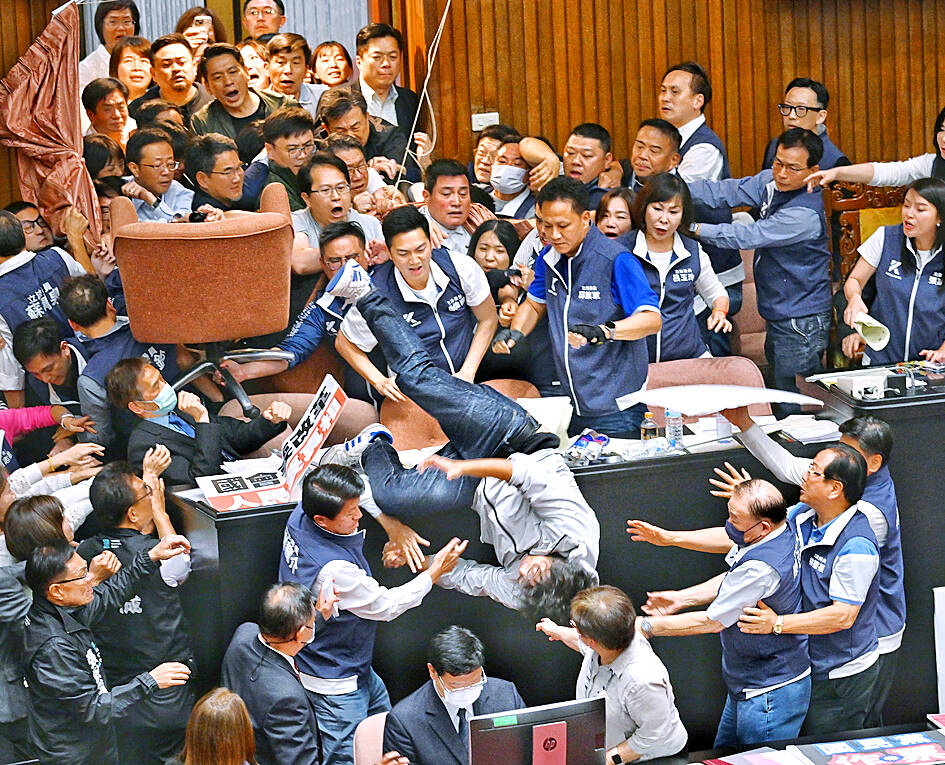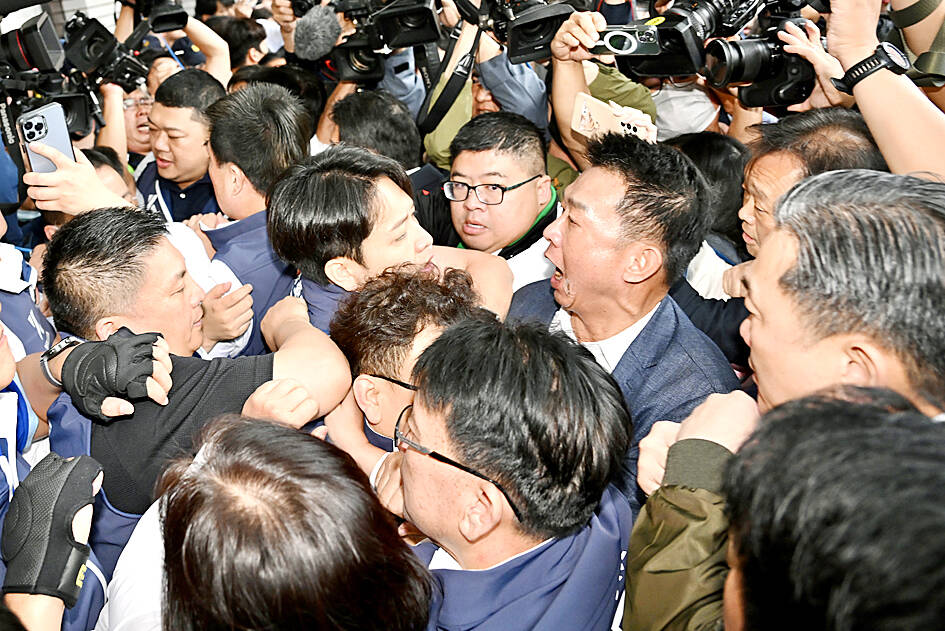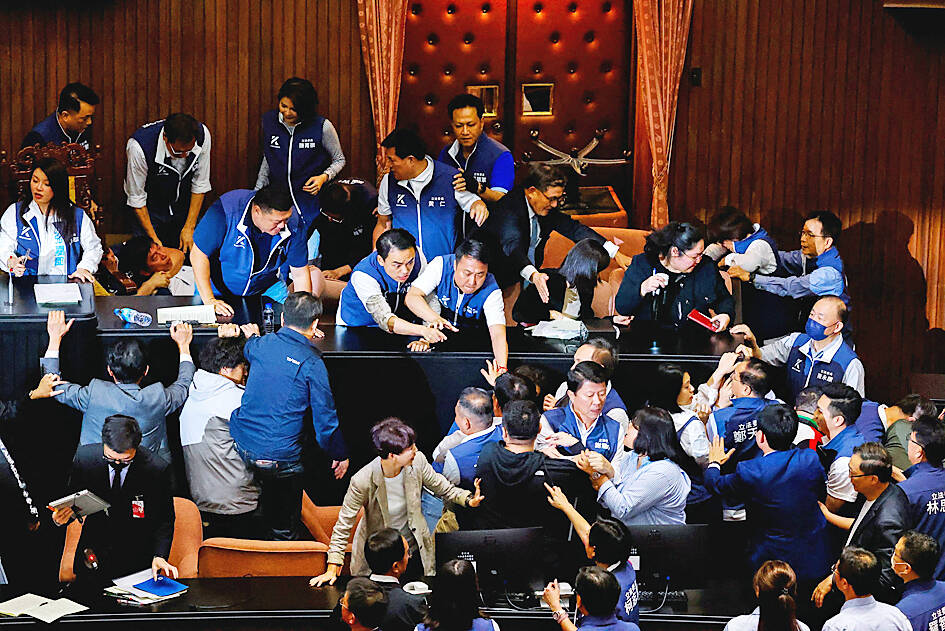A massive brawl erupted between governing and opposition lawmakers in the main chamber of the legislature in Taipei yesterday over legislative reforms.
President-elect William Lai (賴清德) is to be inaugurated on Monday, but his Democratic Progressive Party (DPP) lost its majority in the legislature and the Chinese Nationalist Party (KMT) has been working with the Taiwan People’s Party (TPP) to promote their mutual ideas.
The opposition parties said the legislative reforms would enable better oversight of the Executive Yuan, including a proposal to criminalize officials who are deemed to make false statements in the legislature.

Photo: Fang Pin-chao, Taipei Times
“The DPP does not want this to be passed as they have always been used to monopolizing power,” said KMT Legislator Jessica Chen (陳玉珍), wearing a military-style helmet.
The DPP said the KMT and the TPP are improperly trying to force through the proposals without the customary consultation process in what it called “an unconstitutional abuse of power.”
“Why are we opposed? We want to be able to have discussions, not for there to be only one voice in the country,” DPP Legislator Wang Mei-hui (王美惠) said.

Photo: Lo Pei-de, Taipei Times
When the session started yesterday morning, there was pushing and shoving as KMT lawmakers formed defensive walls at the podium to shield Legislative Speaker Han Kuo-yu (韓國瑜), enabling him to preside over the process for raising motions, reading bills and proceed to a vote.
Even before votes started to be cast, some lawmakers screamed at and shoved each other outside the legislative chamber, before the action moved into the chamber itself.
In chaotic scenes, lawmakers surged around the speaker’s podium, some leaping over tables and pulling colleagues to the floor.

Photo: Ann Wang, Reuters
During the physical altercations, KMT Legislator Hsu Chiao-hsin (徐巧芯) at one point pulled out a flute and played the national anthem, while Chen blocked the entrance to the podium area and shouted: “I’ll take on 10 of you.”
DPP Legislator Huang Jie (黃捷) protested being “physically handled” by Chen and described the altercation “as being bitten by a beast.”
During a recess at about 3pm, DPP Legislator Kuo Kuo-wen (郭國文) snatched documents from Legislative Yuan Secretary-General Chester Chou (周萬來) and ran out of the chamber.
KMT lawmakers demanded that Kuo return the documents and explain himself, while DPP lawmakers claimed Hsu attempted to strangle Wang with a DPP party flag.
Kuo later told reporters that his actions were “justified” as the opposition parties “have been increasingly violent,” adding that the contents of the files he obtained could not be made public.
The differences between the governing and the opposition lawmakers could not be reconciled despite multiple cross-caucus negotiations headed by Han.
With a majority, the opposition at 5:32pm voted to extend the legislative session.
At about 7pm, DPP Legislator Puma Shen (沈伯洋) and fellow DPP lawmakers again tried to force their way up the podium and occupy the speaker’s seat, but failed.
At 8pm, five lawmakers — Shen, Chung, DPP legislators Chuang Jui-hsiung (莊瑞雄) and Chiu Chih-wei (邱志偉), and KMT Legislator Wu Tsung-hsien (吳宗憲) — were taken to hospital.
As of press time last night, the legislative session was still ongoing.
The KMT holds 52 seats in the 113-seat legislature, while the TPP has eight and the DPP has 51. There are also two independent lawmakers who are ideologically aligned with the KMT.
Additional reporting by CNA

SECURITY: As China is ‘reshaping’ Hong Kong’s population, Taiwan must raise the eligibility threshold for applications from Hong Kongers, Chiu Chui-cheng said When Hong Kong and Macau citizens apply for residency in Taiwan, it would be under a new category that includes a “national security observation period,” Mainland Affairs Council (MAC) Minister Chiu Chui-cheng (邱垂正) said yesterday. President William Lai (賴清德) on March 13 announced 17 strategies to counter China’s aggression toward Taiwan, including incorporating national security considerations into the review process for residency applications from Hong Kong and Macau citizens. The situation in Hong Kong is constantly changing, Chiu said to media yesterday on the sidelines of the Taipei Technology Run hosted by the Taipei Neihu Technology Park Development Association. With

A US Marine Corps regiment equipped with Naval Strike Missiles (NSM) is set to participate in the upcoming Balikatan 25 exercise in the Luzon Strait, marking the system’s first-ever deployment in the Philippines. US and Philippine officials have separately confirmed that the Navy Marine Expeditionary Ship Interdiction System (NMESIS) — the mobile launch platform for the Naval Strike Missile — would take part in the joint exercise. The missiles are being deployed to “a strategic first island chain chokepoint” in the waters between Taiwan proper and the Philippines, US-based Naval News reported. “The Luzon Strait and Bashi Channel represent a critical access

CARROT AND STICK: While unrelenting in its military threats, China attracted nearly 40,000 Taiwanese to over 400 business events last year Nearly 40,000 Taiwanese last year joined industry events in China, such as conferences and trade fairs, supported by the Chinese government, a study showed yesterday, as Beijing ramps up a charm offensive toward Taipei alongside military pressure. China has long taken a carrot-and-stick approach to Taiwan, threatening it with the prospect of military action while reaching out to those it believes are amenable to Beijing’s point of view. Taiwanese security officials are wary of what they see as Beijing’s influence campaigns to sway public opinion after Taipei and Beijing gradually resumed travel links halted by the COVID-19 pandemic, but the scale of

Pope Francis is be laid to rest on Saturday after lying in state for three days in St Peter’s Basilica, where the faithful are expected to flock to pay their respects to history’s first Latin American pontiff. The cardinals met yesterday in the Vatican’s synod hall to chart the next steps before a conclave begins to choose Francis’ successor, as condolences poured in from around the world. According to current norms, the conclave must begin between May 5 and 10. The cardinals set the funeral for Saturday at 10am in St Peter’s Square, to be celebrated by the dean of the College